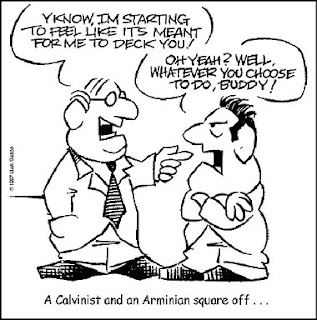I have tried to avoid this question for a long time… But recently a reader wrote in asking what I believe about predestination, and since I have written about other difficult “-ation” questions (such as masturbation), I decided to answer this question about predestination as well.

Here is the straightforward question on predestination that the reader submitted:
Whats your stand on predestination?
Whew!
I am hesitant to tackle this topic. Here’s why:
My Previous Experience with Predestination
 I once preached a sermon on predestination and election, and there was a Calvinistic man in the church who, right in the middle of my sermon, stood up, and loudly said to his family, “Come on. We’re leaving!” He and his family filed out of their row, out the back of the church, and never returned. I later called him to find out why he left, and he accused me of being a heretic.
I once preached a sermon on predestination and election, and there was a Calvinistic man in the church who, right in the middle of my sermon, stood up, and loudly said to his family, “Come on. We’re leaving!” He and his family filed out of their row, out the back of the church, and never returned. I later called him to find out why he left, and he accused me of being a heretic.
This seems to be a recurring theme in my life … and here … and here
Anyway, I sometimes hesitate to write about such controversial topics because I don’t want to chase away readers.
But know this: I hold my view on predestination lightly. I hold it with an open hand. If you want to disagree, that’s fine by me. I won’t hold it against you. Of course, if you want to hold my view against me, well, I think that says something about your view …
Know this also: I used to be a strong 5-point hyper Calvinist. But I did not abandon Calvinism lightly. I got dragged out of it kicking and screaming. So don’t think that the reason I am not a Calvinist is that I don’t know the arguments or “haven’t read the Bible.” Sigh. I am aware of the arguments (I used to teach them myself). I am aware of the Bible passages used to defend Calvinism (I just understand them differently now).
All this is to say, if you want to disagree, that’s fine. But please, be gracious. No name calling. No finger pointing. No heresy hunting. No long comments full of Bible quotations.
What I believe about Predestination
I’ll be as blunt and straightforward as I know how: I do not believe that God predestines some people to go to heaven.
I definitely do not believe in double predestination, where God predestines some people to go to heaven and predestines others to go to hell. I used to believe this (that’s part of the “hyper” in hyper Calvinism), but no longer.
While a complete study on the topic of predestination would also require a study of God’s sovereignty, human free will, sin, and all the passages on election in the Bible, this is a blog post, and I cannot get into all that now (though a book is in the works!) In this short post, I just want to briefly present my views on predestination itself.
 I believe that predestination does not refer to God’s choice of which people get to go to heaven, but refers instead to God’s determination to bring into glory all those who receive eternal life by faith in Jesus. In other words, predestination teaches us about who gets glorified, not who gets justified.
I believe that predestination does not refer to God’s choice of which people get to go to heaven, but refers instead to God’s determination to bring into glory all those who receive eternal life by faith in Jesus. In other words, predestination teaches us about who gets glorified, not who gets justified.
God’s predetermined (this is a synonym for predestination) plan was that He would bring into glory everyone who believed in Jesus for eternal life, that is, for justification. All who are justified will be glorified. As such, there is absolutely nothing in predestination about God’s choice of which people will get justified and which people will not. Predestination has nothing to do with that, and it is a categorical mistake to think it does.
To put it another way, predestination is about the destiny of believers (all will be glorified), not about the destiny of unbelievers (some will get justified and some will get damned).
Or to put it another way again, discussion about God’s predestination should not fall under the category of justification, but under the categories of sanctification and glorification. Predestination is a discipleship issue; not an evangelism issue.
Passages about Predestination
Two of the key passages about predestination are Romans 8:29-30 and Ephesians 1:4-11. In both cases, Paul is pretty clear that predestination is about God bringing people to be conformed to the image of His Son (Romans 8:29), and that election and predestination are most properly understood in connection with being made holy and blameless before God (Ephesians 1:4-5).
God does not choose some to be in Christ while passing over the rest. No, God chooses, elects, predestines, predetermines, decides, foreordains, commits Himself to make sure that every person who believes in Jesus for eternal life, will finally and ultimately be glorified into the image and likeness of Jesus Christ.
Predestination of the saints is about God’s commitment to the preservation of the saints.
This is why no one can snatch us out of the Father’s hand (John 10:29), why nothing can separate us from the love of God (Romans 8:38-39), and why God has given us the Holy Spirit as a promise and guarantee of our inheritance (Ephesians 1:13-14).
Predestination is a controversial topic, but it need not be. The Bible teaches that predestination is about our glorification and sanctification; not about justification. Therefore, if we fight about predestination, we are not living according to what we were predestined for, namely, to be conformed to the image of Jesus Christ.
Now seriously, this isn’t too controversial, is it? Nothing to walk out over, right? Well, let me know in the comments below!







